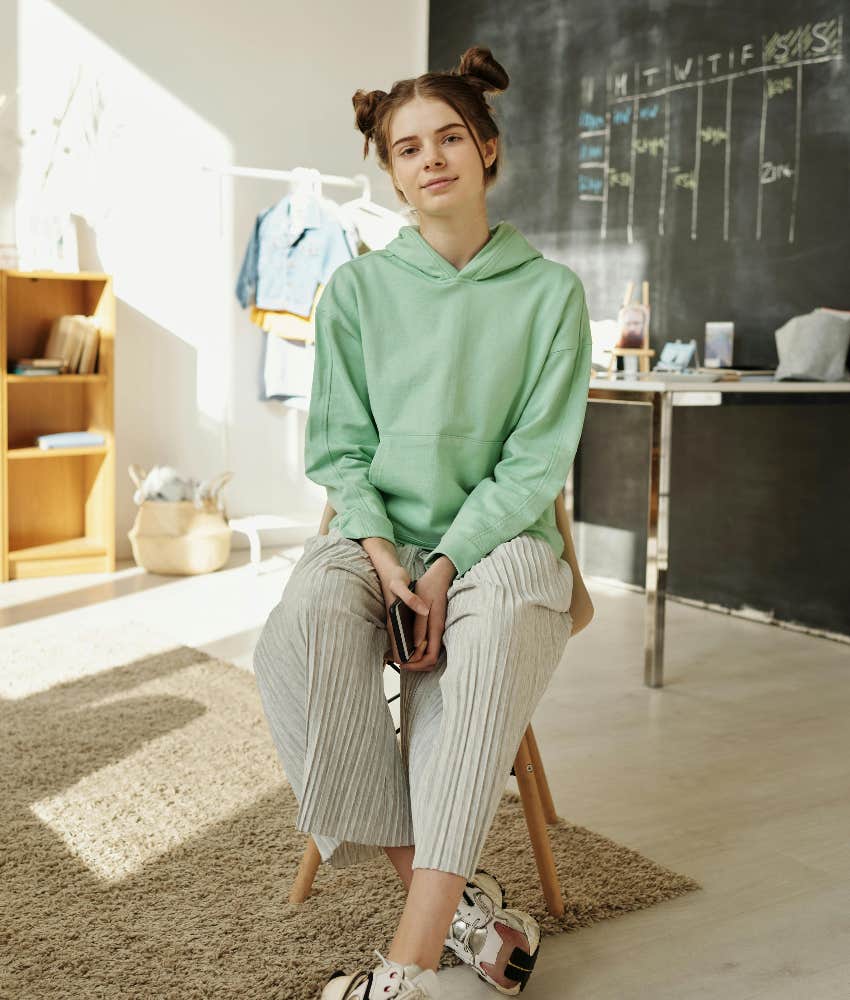Please Don't Tell Me My Teenage Daughter's School Dance Dress Is Too Short
We need to stop shaming teenage girls who are experimenting with what it means to me grown-up and glamorous.
 Liza Summer | Canva
Liza Summer | Canva Last Saturday, my 15-year-old daughter went to her second high school dance with a group of friends. Her dress was short, tight, and a gorgeous shade of royal blue. Perfect for the holidays. We picked it together. And until I posted it on Facebook, I thought she looked fantastic.
Within hours of posting, I felt differently.
By then, I’d heard 15 variations on one theme: Girls today dress like skanks. How could you let her go out like that? I hope my girls never dress like that.
I didn’t tell my daughter what people said. But I fumed. And then I wondered: Why are we surprised our teenagers are profoundly depressed and struggling with their identity and self-esteem?
No matter what they do, no matter how confident they feel, someone is always there to cut them down make them feel bad, or shame them for being themselves. My daughter rarely dresses up. The night of the dance, she pushed her shoulders forward and tripped over her three-inch heels. “Do I look okay, Mom? I feel so weird dressed up.”
I saw the baby on her face. The one I held and rocked. I could see all the stages of her life in this one “practice adult” walking on thick, sparkly heels, her ankles shaking a little. All the girls looked beautiful in their short, tight dresses bought at the same fast-fashion store popular with teenage girls for their holiday dresses.
Every dress in the store was some variation of sparkle, tight, low-cut, and corseted. As my daughter tried on the dresses, glitter fell all around us in piles. “I think it’s supposed to stay on the dress,” I explained and steered her away from the glittery ones.
 EVG Kowalievska / Pexels
EVG Kowalievska / Pexels
All the girls looked gorgeous but they also looked like what they were: little girls exploring what it means to be grown-up and glamorous and fun.
“Mom, do we look pretty? Mom, is it okay to wear this?” What are we telling our kids if we answer: No. You look wrong. What is the message we want them to receive here?
It’s very easy to dismiss these short, sparkly, polyester dresses as cheap. And sure, worry about the working conditions in fast-fashion factories. Worry about the environmental impact.
Worry about the freezing shoulders of teenage girls in strapless dresses during December in Massachusetts. Worry about young feet being stuffed into 4-inch heels that pinch their toes and risk ankle sprains. But don’t worry about the length of my daughter’s dress, please.
Teen depression is on the rise. Especially among girls. One in five teenage girls reported at least one major depressive episode over the past year. Emergency room visits by children and adolescents in that period also rose sharply for anxiety, mood disorders, and self-harm.
And for people ages 10 to 24, suicide rates went up by nearly 60 percent in 2018, according to The Centers for Disease Control and Prevention. Emergency room visits for self-harm by children and adolescents have risen sharply over the last decade, particularly among young women.
We could blame COVID-19. It certainly hasn’t helped. I know my daughter could barely get out of bed some days in junior high during the months she spent distance learning. Back then, I would have dreamed of her putting on a short, tight dress and meeting her friends at a dance.
The way they laughed and sang and complained about the blisters on their feet would have been impossible just last winter. I am so grateful to see her happy again. But being a teenage girl is impossible.
 Julia M Cameron / Pexels
Julia M Cameron / Pexels
If you are sad, you are dramatic. If you are happy, you have to show that in a burlap sack. Anything more festive and you risk being shamed. Maybe this is part of what is making our teenage girls depressed.
To be sure, social media is an issue for adolescent girls. Instagram sparks constant FOMO as everything is on public display and has an immediate barometer in terms of likes and comments that help you gauge how pretty or special you are.
Maybe I should have known better than to put my daughter on Facebook myself. But I do expect adults to know better. I didn’t expect them to shame teens, too.
This is nothing new. In the 1970s, my teenage mother was kicked out of the Vatican because her skirt was too short. Dress codes have long hated spaghetti straps, short skirts, and items of clothing that are uniquely made for girls.
Many are finally coming around to the idea that school dress codes may discriminate against girls unfairly. So, when are the rest of us going to catch up?
Before I had a teenager, I engaged in many ideas of what my children would be in their teens. Those were ideas. They’d be really into studying. They’d be celibate. They’d never cross any lines, do any drugs, take a drink, or talk back. I laugh at those delusions.
Teenagers do teenage things. They experiment and take risks and come running back when those risks fail. The work of parenting them comes in cushioning their falls and in being their soft place to land. In shaming them, we do them a massive disservice.
As we come into holiday dance season and we watch our teenagers walk out the door, shivering, in dresses that barely cover their skin and suits that dangle from disproportionate limbs, consider evaluating your kids with more depth: Are they happy? Are they laughing?
Are they pushing themselves outside their comfort zones and growing into adults who can make their own decisions? If the answer to these questions is yes, consider also refraining from making them feel bad about their clothing choices.
If we want to teach our girls that their bodies are their own, that nothing they wear “invites” sexual assault, and that they should feel empowered in their beauty and sexuality, then the first step is to smile, take photos, and tell them they look beautiful. Because they do. And they are.
If you or somebody that you know is experiencing a mental health crisis, there is a way to get help. Call SAMHSA’s National Helpline at 1-800-662-HELP (4357) or text "HELLO" to 741741 to be connected with the Crisis Text Line.
Sasha Brown-Worsham is an author and editor whose work has appeared in the New York Times and many other publications.

